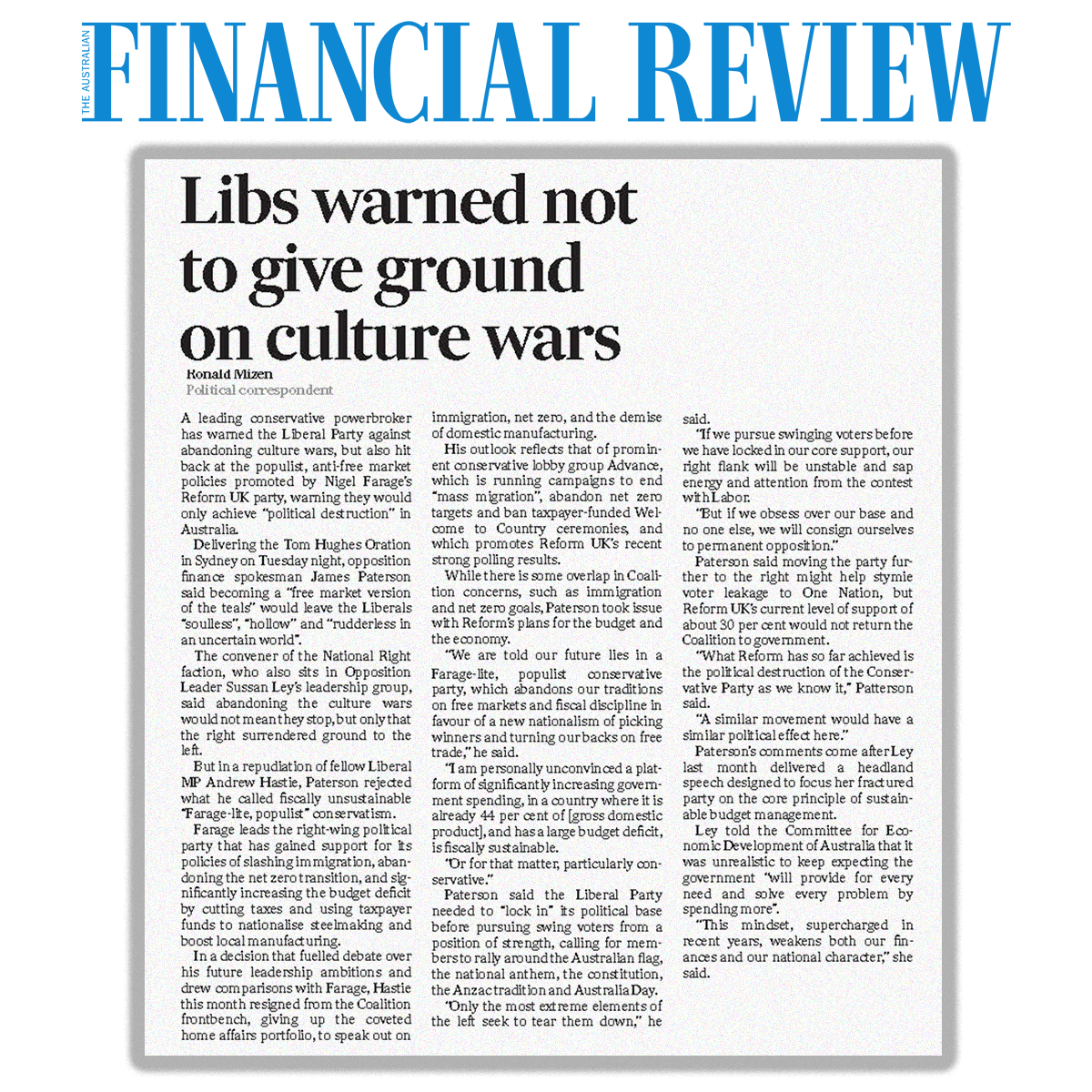Media
|
News
October 15, 2025

Wednesday 15 October
Ronald Mizen
Financial Review
A leading conservative powerbroker has warned the Liberal Party against abandoning culture wars, but also hit back at the populist, anti-free market policies promoted by Nigel Farage’s Reform UK party, warning in Australia they would only achieve “political destruction”.
Delivering the Tom Hughes Oration in Sydney on Tuesday night, opposition finance spokesman James Paterson said becoming a “free market version of the teals” would leave the Liberals “soulless”, “hollow” and “rudderless in an uncertain world”.
The convenor of the National Right faction, who also sits in Opposition Leader Sussan Ley’s leadership group, said abandoning the culture wars would not mean they stop, but only that the right surrendered ground to the left.
But in a repudiation of fellow Liberal MP Andrew Hastie, Paterson rejected what he called fiscally unsustainable “Farage-lite, populist” conservatism.
Nigel Farage leads Reform UK, a right-wing political party that has gained support for its policies of slashing immigration; abandoning the net zero transition; and significantly increasing the budget deficit by cutting taxes and using taxpayer funds to nationalise steelmaking and boost local manufacturing.
In a decision that fuelled debate over his future leadership ambitions and drew comparisons with Farage, Hastie this month resigned from the Coalition frontbench, giving up the coveted home affairs portfolio, to speak out on immigration, net zero, and the demise of domestic manufacturing.
His outlook reflects that of prominent conservative lobby group Advance, which is running campaigns to end “mass migration”, abandon net zero targets and ban taxpayer-funded Welcome to Country ceremonies, and which promotes Reform UK’s recent strong polling results.
While there is some overlap in Coalition concerns, such as immigration and net zero goals, Paterson took issue with Reform’s plans for the budget and the economy.
“We are told our future lies in a Farage-lite, populist conservative party which abandons our traditions on free markets and fiscal discipline in favour of a new nationalism of picking winners and turning our backs on free trade,” he said.
“I am personally unconvinced a platform of significantly increasing government spending, in a country where it is already 44 per cent of [gross domestic product], and has a large budget deficit, is fiscally sustainable.
“Or for that matter, particularly conservative.”
Paterson said the Liberal Party needed to “lock in” its political base before pursuing swing voters from a position of strength, calling for members to rally around the Australian flag, the national anthem, the constitution, the Anzac tradition and Australia Day.
“Only the most extreme elements of the left seek to tear them down,” he said.
“If we pursue swinging voters before we have locked in our core support, our right flank will be unstable and sap energy and attention from the contest with Labor.
“But if we obsess over our base and no one else, we will consign ourselves to permanent opposition.”
Paterson said moving the party further to the right might help stymie voter leakage to One Nation, but Reform UK’s current level of support at about 30 per cent would not return the Coalition to government.
“What Reform has so far achieved is the political destruction of the Conservative Party as we know it. A similar movement would have a similar political effect here,” he said.
Paterson’s comments come after Ley last month delivered a headland speech designed to focus her fractured party on the core principle of sustainable budget management.
Ley told the Committee for Economic Development of Australia that it was unrealistic to keep expecting the government “will provide for every need and solve every problem by spending more”.
“This mindset, supercharged in recent years, weakens both our finances and our national character,” she said.
She called for greater means testing of government support, saying benefits should not go to high-income households, warned against Prime Minister Anthony Albanese’s push to create a universal childcare system where all families pay as little as $10 to $20 a day, and criticised incentives for people to buy electric vehicles.